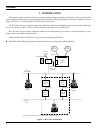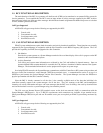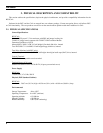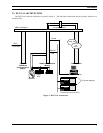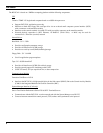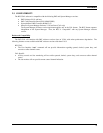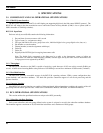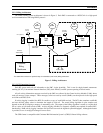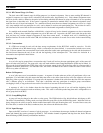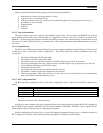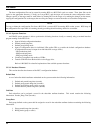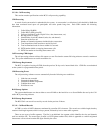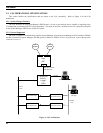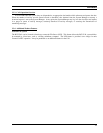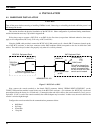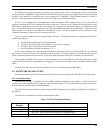
LBI-38965
12
3.2.3.1. RF Channel Usage (Air Time)
The basic unit of RF channel usage for billing purposes is a channel assignment. One or more working RF channels is
assigned in response to a request from a subscriber unit (mobile radio, data terminal, etc.). Each channel assignment event
results in air time, which is defined as the period of time during which the RF channel or group of channels is in use, repeating
the signal from a subscriber unit. If the system is operating in transmission trunked mode, one channel assignment occurs
each time the unit is keyed and unkeyed. In a multisite network, more than one channel assignment can occur in a single
call—since multiple sites can participate in a call—and a channel is used on each participating site. The air time for such a
call is defined as the sum of the air time associated with all of the channel assignments occurring in that call.
In a multiple node network (StarGate or MultiLink), a single call may involve channel assignments on sites on more than
one node. In theory, these channel assignments are part of the same call. In practice, the BCU deals with data at the node
level and does not correlate channel assignment air time from remote nodes. A multiple node call is identified by the
StarGate interface ID as the site ID in the CDR; this facilitates the correlation of records across nodes in the external billing
system.
3.2.3.2. Conversations
If a CDR were created for each call, the data storage requirements for the BCU/CAL would be excessive. For this
reason, a different unit of RF channel usage, called a conversation, has been defined. A conversation includes one or more
calls. Calls are summed into conversations based on the subscriber (radio) units participating in the calls and the duration of
the time interval between the end of one call and the beginning of the subsequent call. The criteria for inclusion in a
conversation are explained in detail below.
Grouping Calls
A set of calls may be grouped into a conversation only if each call involves the same participants and is of the same call
type as all other calls in the set. For group calls, only calls made with the same Group Identification (GID) may be linked. In
this case, the Logical Identification (LID) of the caller is irrelevant, except for the LID of the first caller in a sequence (this is
explained in the next subsection). For individual calls, the caller's LID must be the same as either the caller's or the callee's
LID in every other call in the set.
Broken Call Sequences
A set of calls must occur in an unbroken sequence. A sequence is broken when one of the call participants calls a non-
participant. For individual calls, this means that either the caller or the callee from the first call in the sequence calls some
third party, either a group or individual. For group calls, the sequence is broken if the caller from the first call in the sequence
calls a different group or an individual. Note that a subscriber unit may participate in multiple group conversations
overlapping in time, as long as that unit was not the first caller in at least one of the conversations.
A sequence of calls is also broken when the time interval separating the end of one call and the beginning of the
subsequent call in the sequence exceeds an arbitrary value. This value is called the pseudo hang time and is configurable on a
unit or group basis in the BCU.
3.2.3.3. Group Billing Mode
A group call may be charged to the caller or to the group. The CDR includes a flag which indicates which party to bill.
The choice is determined by a billing mode associated with each group ID or by the default billing mode. Individual calls are
always charged to the caller, except for land-to-mobile interconnect calls and incoming data calls. In each of these cases, the
ID of the caller (or sender of the data) is unknown; thus, the call must be billed to the callee.
3.2.3.4. Input Messages
Input to the BCU consists of a stream of activity messages. As a minimum, the messages include all channel assignment
events and channel drop events generated on EDACS. This includes channel assignment and drop from the Jessica Private
Branch Exchange (PBX) Gateway and StarGate interfaces.



